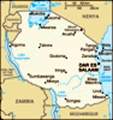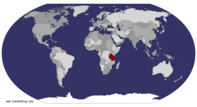Advertisement
Published: August 22nd 2008
Thursday, May 8, 2008 Early the next morning we met for breakfast and got ready for the conference. Dan had been kept so busy since arriving in Tanzania that he didn't have an opportunity to see any of the country. At that point, almost all his time was spent at the lodge preparing for the big event.
Exhibitors were busy setting up their displays. Among them were UNESCO and BRGM, the French Geoscience Institution. Marc Urvois who traveled with us is Project Manager of its Mineral Resources Division. Friends from the excursion looked very professional in their suits. We all cleaned up nicely!
I walked outside while waiting for the conference to start and saw a man take two large unusual-looking rodents from their cages. He held them as though they were babies. These special animals were “HeroRATS,” trained by Bart Weetjens. The project is a partnership between Belgium and Tanzania. The “HeroRATS” in the spotlight at the conference in Arusha were trained to sniff out Tuberculosis, while others are used to detect unexploded landmines.
Maasai singers and dancers were practicing for the show they would perform for H.E. Jakaya Mrisho Kikwete, President of the United Republic
of Tanzania. Some were jumping in place, while others rehearsed African songs.
It was time to be seated inside the large conference hall. The welcoming speech was read by the Deputy Minister of Education and Vocational Training Mrs Kabaka on behalf of Jumahne Maghembe who was not able to attend. Koichiro Matsuura, Director General of UNESCO then greeted the group and spoke of the need to raise awareness on a global scale. He cited climate change, escalating food costs, as well as other problems that call for closer collaboration between scientists and the private sector and pledged UNESCO's support for African countries who work towards that goal. The Director General also emphasized how important it is to involve young people, especially in science programs. “The ultimate aim is to draw global attention to the essential role that the Earth sciences can play in fostering a safer, healthier and more sustainable Planet,” he said.
Various dignitaries of United Nations agencies, plus IYPE officials Eduardo de Mulder, Executive Director, and Larry Woodfork, Chairman of the Board, addressed the distinguished audience. Among the problems discussed were floods, drought, water-borne diseases, melting of the ice on Mt. Kilimanjaro, soil erosion and other
events that affect our quality of life.
Former Tanzanian President Benjamin Mkapa asked, “Is Mankind a community?” He said that undeveloped countries were the most affected and it was important to preserve human life. He emphasized that global leadership was needed for climate change.
A group of young students entered the hall and came down the aisle to present a delightful cultural show. They sang, then told why it's important to save our planet. The youngsters were so eloquent that many of the adults had tears in their eyes. The children were given a standing ovation when they finished. If our world is left to young folks like these, the planet is in good hands.
Every speaker at the morning session was excellent, presenting a wide variety of problems and possible solutions. It was time for President Kikwete to give the opening address. Among his many accomplishments, Tanzania, under his leadership, was the first country in Africa to recognize the importance of IYPE and helped to spread the message to others on the continent.
The President spoke about what makes his country unique—the Serengeti, Ngorongoro, Mount Kilimanjaro, the crater, ancient footprints and other sites found only
in Tanzania. He said it was fitting that the Year of Planet Earth promoted sustainable development. He talked about natural hazards such as volcanic activity and earthquakes, then gave human action causes. Among them are indiscriminate mining, over-fishing and deforestation. Because of those and other reasons, the world faces dangers such as global warming which causes smaller lakes to die. At the same time, a rise in sea level is submerging islands. High waves are damaging Zanzibar's coast, and beach front is being lost.
“IYPE shouldn't end with the year,” said President Kikwete. He encouraged the organization to continue its advocacy and action.
The Honorable Dr. Batilda Burian, Minister of State Environment in the Vice President's office, gave the vote of thanks to the large group that had come together to share ideas for protecting the planet.
We went outside for pictures where the President and other dignitaries generously posed with many groups.
When we broke for lunch, Dan asked me if I would return to Ngorongoro and Lake Natron with Bill, so we could video the people and stories I related to them. I said I'd be glad to, but added that Fredrick, who knew
so much about the area, should come with us. He would be able to talk about the geology, as well as act as an interpreter if we need translations. I asked how soon he wanted us to leave. Dan responded, “Can you be ready in an hour?”
It took coordination. First we had to see if Fredrick was available. Majura, whom I learned was usually called “Songo,” made arrangements for a Land Rover and driver, as well as asking Fredrick if he was willing to come. Since our young friend was at the conference to hear the speakers and meet other geologists, we didn't know what Fredrick's answer would be until after we talked to him.
My shirts and jeans had been full of the black dust left from the lava, so I had sent them to be laundered, fearing that the dirt would never come out otherwise. Finding them hanging in my closet meant I'd have clean clothes. I quickly packed a bag and went to the reception area. While waiting for final instructions, we made a quick stop at a small local store to get water and cookies. Good thing, because we didn't stop to eat
along the way. Actually, other than the restaurant that served the bird, once off the road there was no place we
could have stopped. The cookies came in handy.
I had gone to the lodge gift shop several times, talking to the wonderful Indian owner and his son who was a third generation African of Indian descent. The items were lovely, and the prices were reasonable, plus I was to get a “family” discount because I had strong connections to India and could say a few words in Hindi and Gujarati. Each time I planned to buy something, I had to leave. I had my eye on a photographer's vest, but there was no time to get it.
Before going out of town, we took Fredrick to his small hotel in the city so he could get his clothes. I went in to use the facilities and noticed a sign, “Men and women of immoral turpitude are strictly not allowed in the rooms.” I passed the test.
By the time we left, it was late. The rush hour delayed us further. We reached the outskirts of the city, in time to see beautiful cloud formations. Bill attached
a device to the window that would act as a tripod and began taking time-lapse video.
Our driver Ali was excellent, though I must admit I tried to find something to hold onto as he sped along the rocky and dusty trails. By this time it was quite dark, and I was amazed that he was able to go so fast without hitting the small animals that scampered out of our way. Bill had gotten so little sleep since he left the US, that he dozed quite a bit. He deserved the rest. There was nothing to see, and he'd need his strength for the coming days.
Several hours later, we arrived at our destination. We were on a hill above the Maasai village I had gone to with Songa, though I didn't realize it at the time. A large open building had a light or two, but it was pitch black in the area where we got out of the ATV. Two young men greeted me warmly. I didn't recognize them because I couldn't see at all. They reminded me that they were at our camp the morning before, and I had taken pictures of them. They
led us to the stone building at the left. Each of us had a separate room with our own door and interesting old-fashioned key. There wasn't much space for anything other than the bed and a small table.
We met at the large building and negotiated to get dinner, even though the kitchen had closed. Two bathrooms and two showers, each separated by walls, were in a nearby building to the right. The toilets were holes in the ground and smelled pretty bad. To “flush,” we filled a plastic bottle with water from a container. The shower stall next door had faucets and a shower head on a pipe. There were no lights.
Bill left to take shower. When he came back, he declared it the best he had ever taken. We ate rice and “mystery meat,” which were tasty, especially because I was so hungry. I had stomach problems as a result, but was grateful for the food. A bat kept circling above us. The fellows had a beer as we discussed the plan for shooting: who would participate and what each would say. Bill was an expert, and devised how we'd do it.
I asked
if we could get the man who told me about the proposed soda ash factory at Lake Natron, before he went to work, and they said they'd do it. Bill wanted a woman to talk about the volcanic eruption, and I asked if one was a leader. They'd have her come, too. Fredrick would be on camera for any of the geological sites and would be the “lead” in the production.
Everything was settled, and I went to get my clothes for a shower. Bill loaned me a flashlight that was to be worn around the neck. I put it on the door hook so it wouldn't get wet. I was almost sorry I did, because it illuminated all the bugs crawling around on the floor and walls. I washed quickly and was eager to get out. Bill and I have different ideas of the word “best” when it comes to showers.
I returned the flashlight and went to my room. The mosquito netting was hung from a center ring, instead of four corners. It was harder to make sure it covered the entire bed, so I tucked it in. The room was so hot that I switched

 Dignitaries with Students
Dignitaries with Students
H.E. Jakaya Mrisho Kikwete, President of the United Republic of Tanzania, H.E. Koichiro Matsuura, Director General of UNESCO and other high-level officials pose for pictures with many groups.places and moved the pillow to what had been the foot of the bed—just trying to get a breeze. A dog barked continuously until I fell asleep at about two in the morning. Several hours later, I was awakened by a crowing rooster. I snoozed, then got up to take pictures.
Advertisement
Tot: 0.109s; Tpl: 0.013s; cc: 9; qc: 50; dbt: 0.0553s; 1; m:domysql w:travelblog (10.17.0.13); sld: 1;
; mem: 1.2mb














